Maserati GranCabrio First Drive Review: Want an electric convertible? This is it

LAKE MAGGIORE, Italy — Driving the Maserati GranCabrio Folgore on its picturesque home turf, and studying Maserati’s press materials, I’m convinced the Italian automaker has buried the lede. Especially when every auto journalist is questioning a pricing strategy that finds some GranTurismo coupes and GranCabrio convertibles brushing past $200,000. That gets into Cloud 9, Bentley-and-Aston-Martin territory. To counter the whispers, here’s the part I’d be shouting about: The GranCabrio Folgore is the world’s first and only luxury electric convertible. That alone might intrigue some free-spending, first-on-their-block buyers.
Then, Exhibit B: Like the plug-in GranTurismo coupe, the convertible will out-accelerate any rival Bentley Continental GT or Aston DB12, a margin that grows positively yawning as speeds climb. A rocking 750 horsepower and rock-crushing 995 pound-feet of torque will do that. This Italian job is also noticeably more agile and connected to the road than the isolated Bentley droptop, and easily on par with Aston’s best GTs. That includes a gasoline Trofeo version whose 4,316-pound curb weight undercuts a GT Speed convertible by more than 1,100 pounds; mated to 542 horses from its twin-turbo, 3.0-liter Nettuno V6, a detuned version of the engine in the MC20 supercar.
This Italian sexpot is arguably a prettier car than the Bentley, and nearly as head-turning as the Aston, judging by public reaction to our convoy of beautifully painted models: Rose gold was a knockout specimen, along with a deep blue with metallic flake called Night Interaction, a burnt orange and a sizzling red. Anything but bright yellow, grazie.
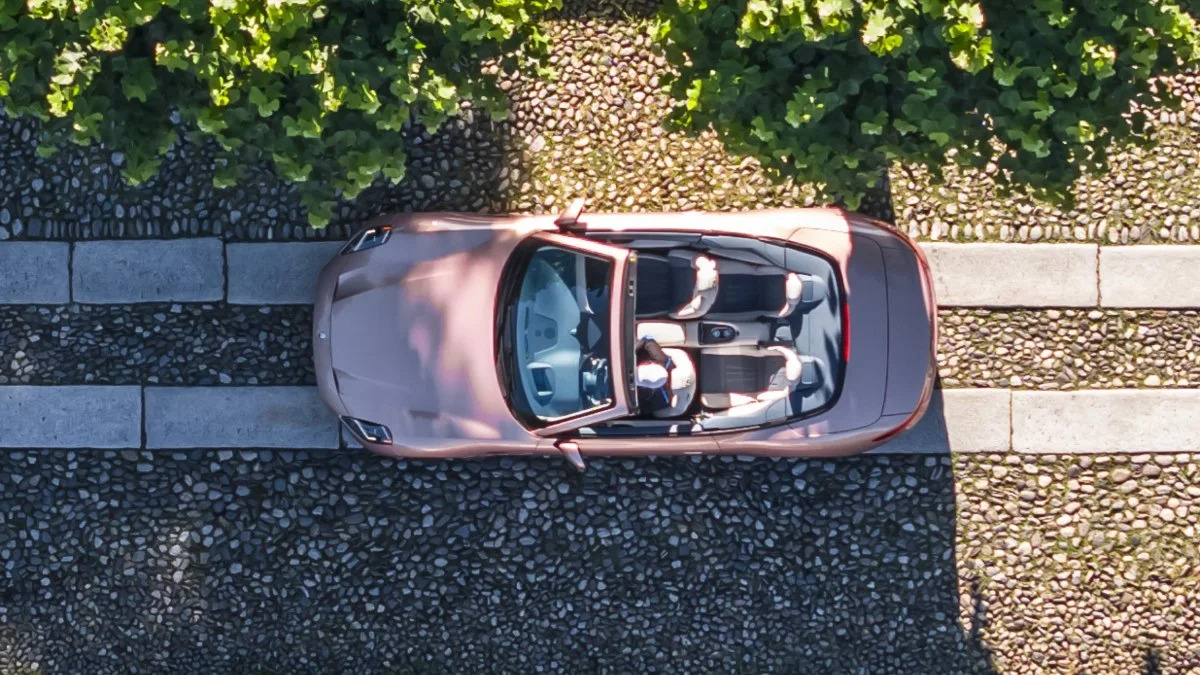
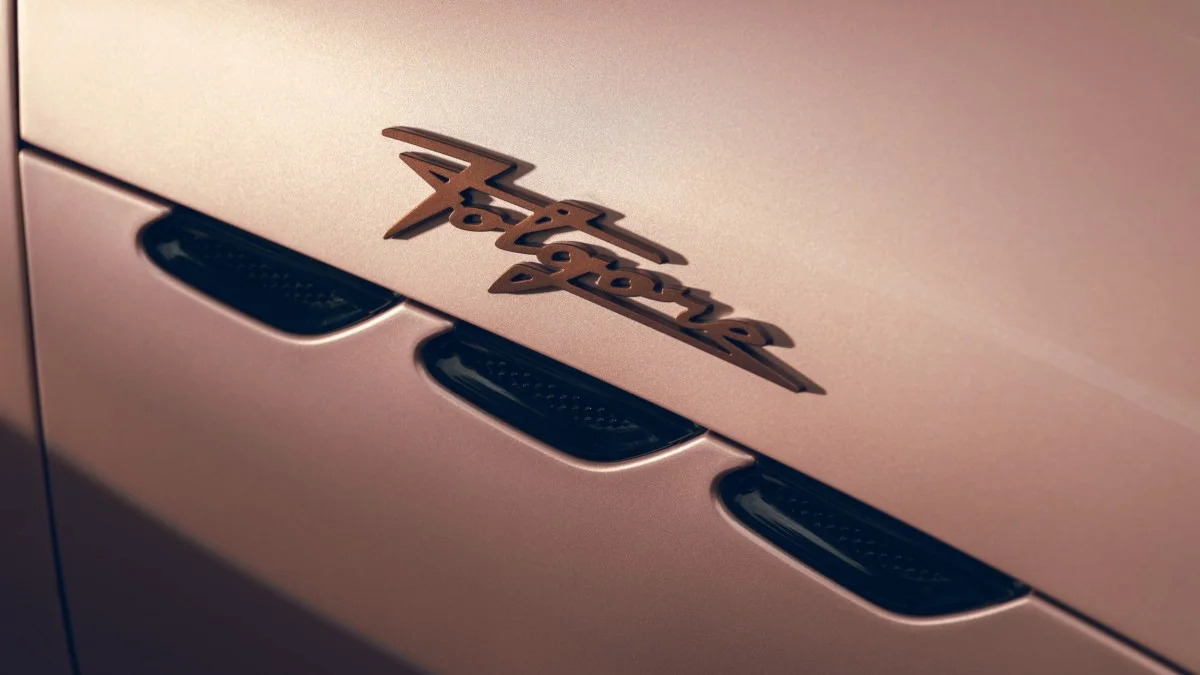
The Maserati also carves out more passenger space than the British duo. It’s a legitimate four-seater with room for two adults in back — after a bit of space-sharing from front-seaters — versus a Bentley or Aston whose back seats are glorified parcel shelves. Finally, the Maserati’s vividly realized electric powertrain advances the tech future, where Bentley and Aston’s relatively pokey corporate V8s are rooted firmly in the past. So that’s four objective wins for the Maserati, in key areas I assumed auto journalists also cared about: Power and acceleration, sporty handling, interior space and technology.
Honestly, the Bentley’s only decisive win is its gorgeously wrought London library that doubles as a car interior. The Aston’s cabin also tops the Maserati’s in materials and execution. So score one win for Team Brexit, and four for Maserati. Hmm: Maybe it’s the Bentley and Aston that are overpriced?
That last bit is tongue-in-cheek, of course. Bentley and Aston can charge what they charge because of their brand cachet, however shaky at times. Stellantis’ Maserati brand is in no such position, its opaque reputation further clouded by tepid models like the Levante and Ghibli, and one egregious Quattroporte sedan, all out of production and unlikely to be missed. The brand is determined (again) to upgrade those perceptions, focusing attention on seemingly disparate SUVs and supercars.
The GranCabrio is another Maserati entirely. An opening run up the western shore of Italy’s Lake Maggiore, a vacation playground just north of Milan, let the Maserati play its GT role to the hilt. A tightly tailored soft top drops in 14 seconds and closes in 16, at speeds up to 31 mph. Behind that imposing Trident-capped grille, a clamshell “cofango” hood is formed from a single hunk of aluminum, eliminating unsightly cutlines over more than three square meters of surface area. The Maserati looks elegant yet powerful, with four swoopy fenders and an alluring silhouette with the roof up or down.
For the gasoline Trofeo, the compact V6 sits entirely behind the front axle. That allows a sexily crouched front end and hood that would have been impossible with a V8, and makes room for a driven front axle. Trunk space suffers a bit versus the coupe, at a maximum 6.1 cubic feet with the top up, or 4.6 cubes with the roof tucked away.
The start is a great opportunity to soak up morning rays and listen to a Sonus Faber audio system by the U.K. audiophile company, which is among the best and clearest I’ve experienced in a convertible. Even at highway speeds, music sounds like, well, music. At any speed, on any road, this GranCabrio is a joy to drive, or to ride shotgun in: Fluid and relaxed, but ready to spring into action and fly through these shore-hugging curves.
The Folgore puts a trio of electric motors to work, each rated at 300 kilowatts. In GT mode, the GranCabrio prioritizes front-driven wheels to save energy. Sport and Corsa modes dial up contributions from dual rear electric motors, mounted inboard to aid balance. Those three radial motors could generate up to 1,200 horsepower, but are limited to 750 wheel-horsepower by total battery capacity. Compact silicon-carbide inverters boost rapid energy conversion and performance.
An 800-volt architecture allows DC charging at up to 270 kilowatts, right up there with the industry’s quickest-drawing EVs. A free Level 2 wall box allows home charging at up to 11 kilowatts. Maserati figures a 450-kilometer range on Europe’s WLPT cycle, which should equate to a roughly 260-mile range under the EPA’s more-realistic estimate.
Try these numbers on for size: At just over 5,200 pounds, Maserati’s all-electric convertible weighs about 200 fewer pounds than Bentley’s gasoline-powered Continental GT Speed convertible. That’s a first for any apples-to-apples, EV-versus-ICE comparison. Some credit goes to a weight-saving, largely aluminum chassis with sprinkles of magnesium. Combine that with 750 horses and 995 pound-feet of eye-blink torque, and it’s the definition of an unfair ICE fight.
A company-estimated 2.8-second surge to 60 mph feels like sandbagging, based on the seat of my pants. A 9.1-second rip to 124 mph (200 kph) beats even Porsche’s Taycan Turbo S coupe by 0.5 seconds. And it’s about 4.5 seconds quicker than that 650-hp GT Speed convertible. Buh-bye, Bentley.
The Trofeo, for its feathery part, weighs about 1,150 fewer pounds than the Bentley convertible, imbuing this Italian GT with acceleration on par with more powerful gasoline competitors, along with agility you can’t fake.
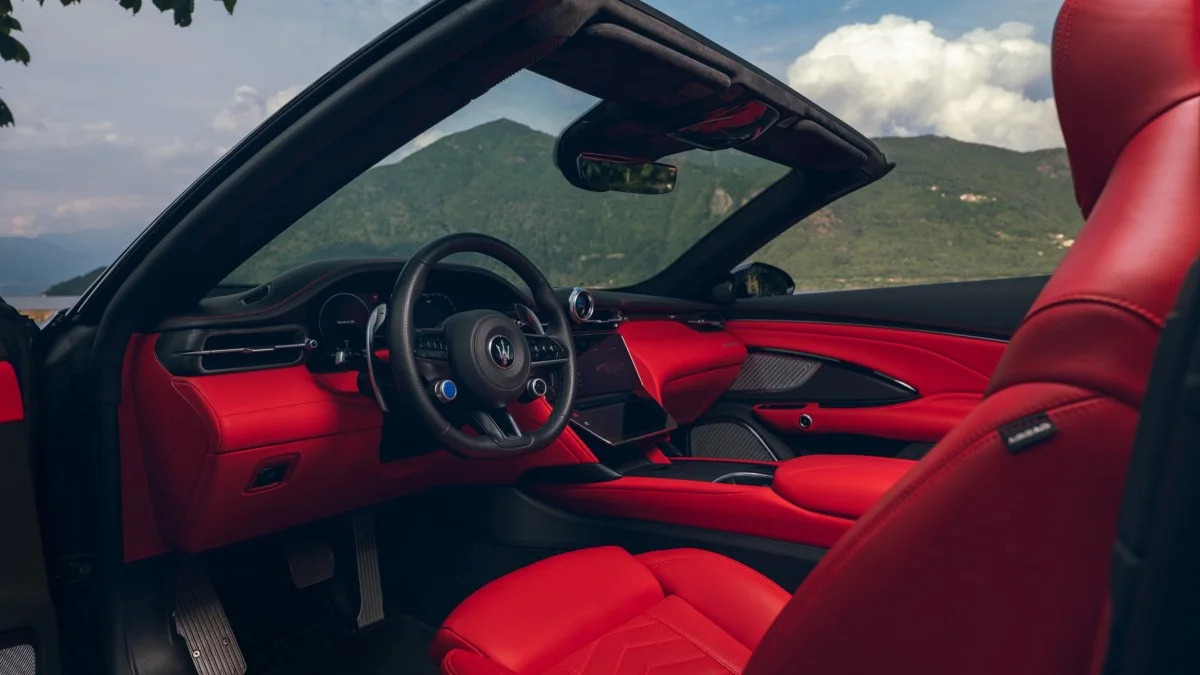
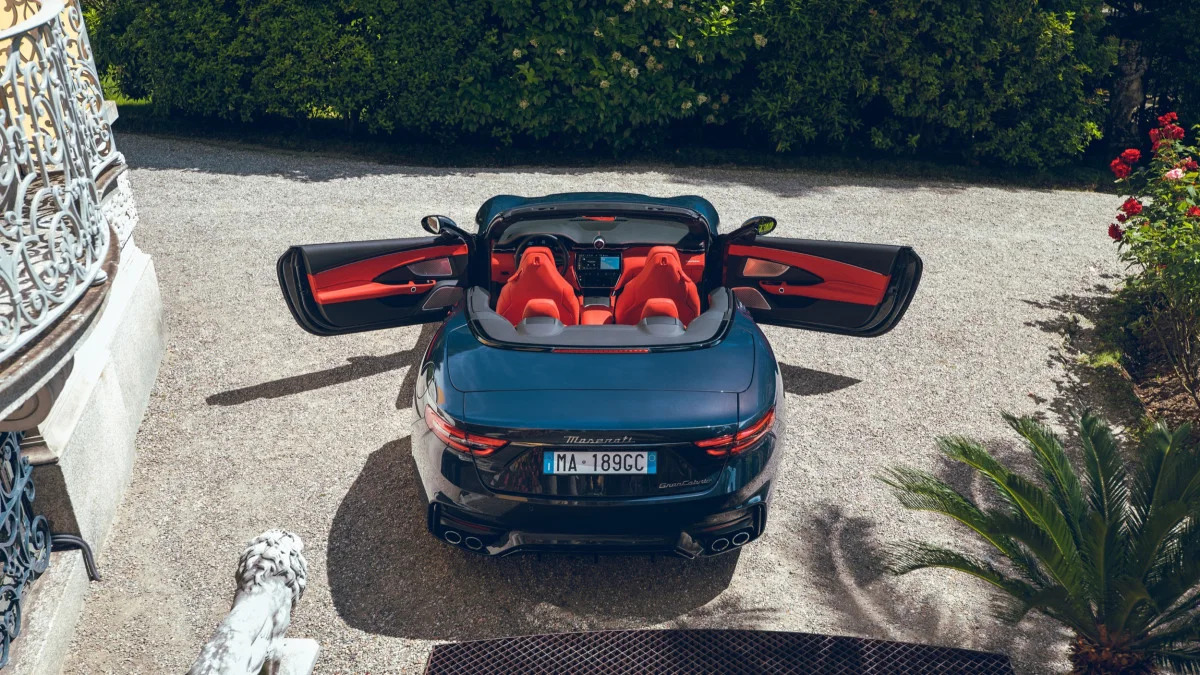
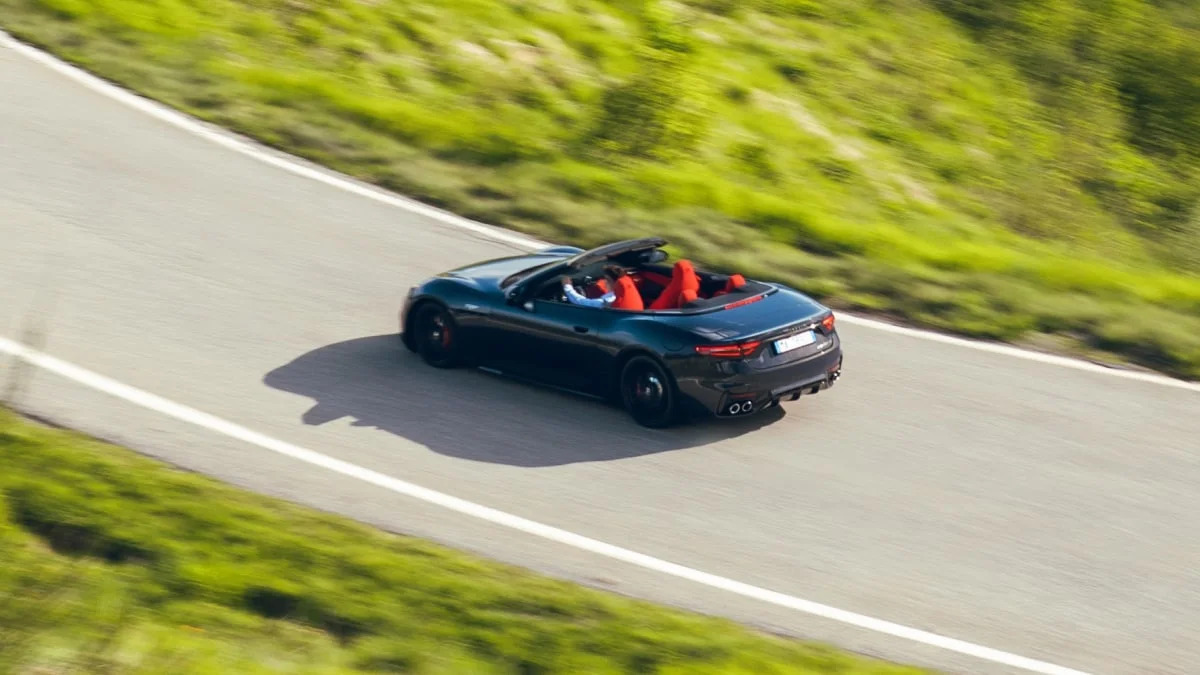
That blistering acceleration isn’t some one-note parlor trick. Unlike EVs with skateboard platforms — which push rooflines awkwardly higher — the Maserati integrates 92.5 kilowatt-hours of LG Chem pouch cells in a T-shape along the center spine and behind rear seats. Coupe or convertible, Maserati claims the industry’s lowest-riding EV. With more battery mass centered in the car, the Maserati turns in with notable eagerness, and avoids the dull understeer that plagues many EVs as they approach handling limits. Throw in excellent suspension tuning and balance, with a 48/52-percent bias between front and rear, and the Maserati definitely leans toward the sporty end of the GT spectrum, without sacrificing ride quality.
Steering is a high point, a sommelier-level pairing with the Maserati’s creamy-yet-spicy electric powertrain. That steering is light, connected and natural, with none of the numb or synthetic on-center feel that mars many EVs. In the highest compliment, the GranCabrio just drives like an Italian car. I’ll say it again, having driven both coupe and convertible Folgores: The Maserati steers better than a Porsche Taycan. And it sets a new bar for other EVs — including anything from Dodge, Jeep and other Stellantis brands — to shoot for.
If only the interior felt as rich as the performance. A mostly traditional GT cabin that would pass muster at, say, $100,000 or $120,000 draws more skepticism and scrutiny at these prices. Mushy-feeling plastic dashboard switches for the transmission are the prime offender, followed by switchgear for windows and steering wheel that look straight from Stellantis’ parts bin. The leather is sumptuous, at least, including a bright-red holiday wrapper in the Trofeo we tested. A digital version of Maserati’s traditional analog clock also displays data such as g-forces. A clever “saddle-shaped” screen ensures that none of the display elements are blocked by the steering wheel. The Folgore features industry-exclusive Econyl, a neoprene-like fabric whose fibers are derived from old fishing nets, carpeting and other recycled nylon sources.
The Stellantis-based infotainment system’s dual center screen recalls an oversized flip phone, integrated into the lower dash and making room for a small console cubby. An infernal haptic slider controls volume, its display washing out badly in sunlight, but a secondary volume control lives behind the steering wheel.
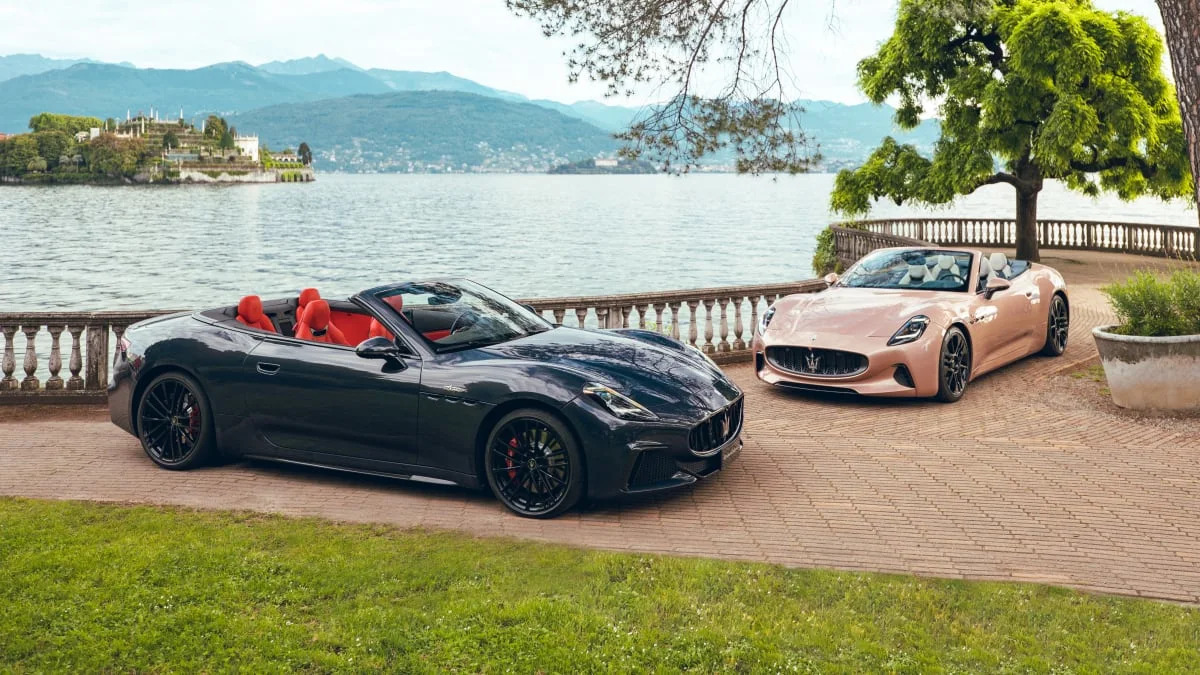
On a tight mountain ascent and descent near the Swiss border, the Folgore comes into its own, a near-silent magic carpet gliding through corners at speeds that might make Aladdin wet himself. Grip is appropriately monumental, with Maserati eschewing all-season or energy-saving rubber for summer Pirelli P Zeroes, staggered at 20 inches front, 21 inches rear. Well-chosen EV audio sound hums sweetly and avoids EDM gimmickry. Regenerative brakes, operated through Ferrari-esque metal paddles, could use an additional setting for one-pedal driving, but their three settings offer a reasonable range between pure coasting and strong deceleration.
Now, if you’re sitting down, let’s run through prices: The GranCabrio Trofeo starts from $193,995 (including $1,995 in destination), or $206,995 for the electric Folgore. I won’t strenuously defend the gasoline Trofeo at that price; despite capable and competitive performance, it’s not as singular and special as the Folgore.
It’s fair to question the Maserati’s stratospheric pricing strategy. But you can’t question the Folgore’s performance and technological bona fides, which objectively meet or beat anything in its class. If we’re talking electric convertibles, it’s currently a class of one. That makes the Maserati a unique alternative to, say, a Porsche Taycan Turbo S. And let’s be clear: Nobody is selling more than a few thousand GTs a year in any price segment. Last I checked, no one runs around claiming Bentley, Aston Martin or Porsche are great financial values. Since most of us can’t afford any of them, one more overpriced grand tourer isn’t hurting anyone.







